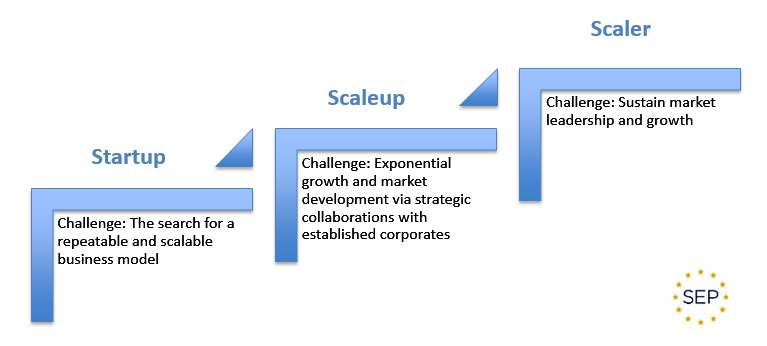Scaling up is difficult, maybe more than starting up. Getting a company to be profitable with a handful of employees can be quite challenging, but having a profitable company with hundreds of employees is a rare scenario exclusive to those who possess great management skills along with leadership ones. A new category of businesses has been created and it’s called “scale-ups”. Start-up has now become a common word, but what exactly is a scale-up? Alberto Onetti, Chairman of Mind The Bridge Foundation, gave us his definition of scale-ups. “Scale-ups are start-ups that have reached a “critical mass” and are ready to become relevant contributors to the economy (both in terms of generating revenue and employing people). There are multiple types of “critical mass” for different types of business. This could be relative to the investment put in to date, the revenue, the headcount and the time the business has been in existence.” Onetti coordinates a EU Commission program dedicated to helping start-ups get to the scale-up phase. We asked him what are the main difficulties companies face in this transition. “In scaling-up, companies need capital, management, skills and organizational processes. These are the ‘growing pains’, quoting the “The Scale-Up Report on UK Economic Growth” presented by Sherry Coutu in London last November at Silicon Valley comes to UK (where Startup Europe Partnership – SEP – organized one of its Matching Events in 2014). Among them, capital is not the main issue. Good companies are able to raise money. They face hurdles in finding the employees and competences required to grow and expanding internationally. Driving a lean three-man band in a garage is different than leading a 100+ employees company and operating globally. And growing from 10 to 100 employees and over is not a walk in the park. It requires managerial and leadership capability that often are not part of the original skill set of the startup.” he states. He says other pain points are dealing with large companies. SEP puts the start-ups in direct meetings with large companies that have expressed interest in the field or in the specific company. “If you want to scale-up you need large customers/partners. And large established businesses are really different (in terms of culture and procedures) compared to startups. But working with them is a must if you really want to grow. As SEP we are exactly working in bridging startups (the best of European breed) to large companies and smoothing as much as possible the interaction. The goal is to help startups to sell/distribute their products/services at international scale leveraging the distribution channel and critical mass of large corporates.” The results of the program are definitely interesting, with 106 qualified meetings, 15 follow-ups, 8 business discussions and 1 deal closed to date. This happened in a relatively short time-span of about 6 months starting on May 22nd last year. We also asked an entrepreneur, Chloe Macintosh, what difficulties she encountered in scaling up from 5 to 100 employees. She currently runs the ecommerce website Made.com with over 100 employees in central London. We had a chance to meet her at LeWeb 2014 in Paris and this is what she said: “When you start a business, especially when you’re trying to disrupt the industry […] you have to work against the experts in the field. Then you realize you need those experts.” Making key hires, who have experience in the business, is the next big step in a start-up wanting to change the way an industry is run. Every start-up will have to face this task and hiring the right people from the appropriate fields is a must. In Made.com’s the know-how needed was in the fields of retail and logistics. The replies from the two points of view are quite different. One is clearly more Venture Capitalist minded – based on management, clients, and revenue – while the other finds value in people. Both are needed and the various perspectives give a good idea of what to leverage when speaking to different players. Contributor: Carlo de Micheli
© RIPRODUZIONE RISERVATA
